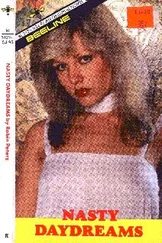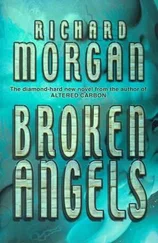The story went that Jesus was abducted, but nobody can really say for sure. The thing is, he would have been really easy to kidnap. Jesus trusted everyone. He probably walked right into the kidnapper’s car without any hesitation.
There were pictures of Jesus plastered to every telephone pole in the city, and practically the whole school had to be treated for post-traumatic stress syndrome. It seemed like no one could get the image of him walking into that kidnapper’s car out of their heads.
This one kid in our gang, Peter, said he saw Jesus in the park three days after he vanished, walking across the kiddie pool. But you couldn’t believe what Peter said. He’d become totally obsessed with Jesus after the disappearance. Every composition he wrote in class was about him. The teachers said that it was his own way of coping with the stress.
I guess I was dealing with some serious stress of my own, because one day in art class, when the teacher told me that little girls who wore black tank tops didn’t get into college, I stood up and yelled, “What makes you so perfect, you jerk! You’ve done too many lousy things yourself to be judging children!” And the teacher got all red in the face because he knew it was the truth.
I knew that Jesus would have loved that one. It was the kind of thing that he would say, and it felt good to say it.
It all began with a very young scientist named Vladimir Latska, who lived and worked in Moscow. He had graduated from university in 1949 when he was eleven years old, and for a time he was often seen on television and heard on the radio, babbling prettily about cells and biology. He had big blue eyes and he would tilt his chin up to the heavens when he lectured, as if to accentuate his concern with lofty spiritual matters. His hair stuck straight up in the air, which was all the rage among young geniuses at the time, and he wore the same shabby suit covered in soup stains for three years straight, as he was too profound to bother changing his clothes. He waved his hands excitedly when he spoke. It was as if he was a conductor and the world was his orchestra, and he was trying to get it to perform a magnificent concerto. He almost danced when he spoke about science, lecturing at times on his tippytoes. It made him beloved by audiences even when, at times, they didn’t understand a word he was saying. They would line up after his lectures on genetics to have an opportunity to pinch his cheeks.
After several years in the laboratory, he went to the government and announced that he had discovered a way to clone animals. To prove it, he had with him a cage filled with white kittens that he declared were identical and were all named Boris. The kittens were all curled up together, like a pile of snowballs that had been patted together by small mitted hands in preparation for a war. Latska quoted dozens of poems, explaining the wonders of cloning and the beauty of multiplicity. Of course no one believed him, and they weren’t sure why they had arranged to have a meeting with this teenager. The officials held up the kittens and claimed they saw subtle differences. Latska offered to take them to his laboratory outside the city, where he had thousands of additional cloned Borises running around on his property. They laughed because there didn’t seem to be a point in having three thousand kittens named Boris, and what with the Soviet Union being what it was in 1955, they were very busy.
Never living up to his early potential, Latska began to be seen more as a flamboyant entertainer than anything else. The world had all but forgotten him when, years later, in 1961, Rudolf Nureyev, the country’s most exciting young dancer, ran screaming to the police at an airport in Paris, demanding to stay. Nureyev defected, much to the government’s and the Soviet people’s dismay. It was considered so damaging to Soviet propaganda that it was kept out of the national press, and the government tried to pretend Nureyev had never existed. “Rudolf who?” was the official party line. The rest of the world, however, went batshit crazy, in a manner of speaking, for Nureyev, celebrating his every movement, putting him on the cover of magazines and catapulting him to fame. That was when Vladimir Latska chose to return, approaching the government this time with a proposal that they found intriguing. Latska claimed that through cloning, he could deliver back to Russia a new and improved Nureyev.
The government decided to give Latska a chance. They gave him a vial of blood that a nurse had collected from Nureyev during a routine checkup, and almost unlimited resources for the project. Ordered to keep the operation absolutely top secret, Latska and his men, a group of unemployed scientists and unlicensed doctors from the countryside outside Moscow, got into planes and headed to a small town in northern Quebec called Pas-Grand-Chose. In addition to being a desirable location because of its isolation, its proximity to tundra, and the fact that it had not had a tourist in a hundred years, the town was also singled out because of its high unemployment rate. It had been the country’s largest manufacturer of bloomers, and when they went out of style after 1941, the citizens of the town found themselves in dire straits. The area had the broken, random look of a train set that a child had abandoned years before. The Canadian government turned a blind eye as the town welcomed the project with open arms, hastily constructing a makeshift enclosure around Pas-Grand-Chose in preparation for the arrival of the covert scientists.
Banned from most universities, Latska’s team of misfit scientists was also wildly enthusiastic about the idea of regular work. Vladimir Latska believed that the only worthwhile scientists were the mad ones. Other scientists asked too many questions about the implications of their research, never taking the irrational leaps of faith necessary for true discovery. Latska believed that the Nureyev Experiment was really a magnificent project, certain to be a shoo-in for the Nobel Prize and to re-establish his credibility. Latska put an ad in the newspaper looking for homes for his three thousand kittens named Boris. He took only one Boris with him though, that being all he really needed. Perhaps he should have taken it as a sign that we only really need one of a good thing.
There was a parade in Pas-Grand-Chose for all the mad scientists when they got off the plane. They were a curious sight with their hair sticking straight up in the air, their bottle-cap glasses and their briefcases that had smoke coming out of them. They had cardboard boxes filled with beakers and Dungeons and Dragons sets. None of them had girlfriends.
With a bunch of Nureyevs, the Soviet government would be able to open shows every night in every major city in the world. They could even have two or three of them touring together so that they wouldn’t get tired. They could do three-month engagements, and if one broke an ankle or had a nervous breakdown, it wouldn’t be a problem in the least. They had put a spacecraft on the moon, and now this! Nureyev would be sorry that he had thought himself unique. He was replaceable. It was the Soviet Union that was unique.
There were twelve Nureyevs cloned in 1961. The scientists and indeed the whole town were reverent of the handsome little Nureyev boys. Everyone was in awe of the fact that these children were actually the greatest dancer of the twentieth century. The boys walked around town in fancy little suits, carrying red balloons, and everyone kissed them and told them how wonderful they were.
The scientists were determined to give the Nureyevs happy childhoods. Whereas the real Nureyev had only been able to join a professional dance school when he was seventeen, these Nureyevs had dance classes starting when they were five years old. They would learn both Russian from the scientists and French, which was the language of ballet, from the inhabitants. They wouldn’t have a father who would be away at the front for most of their childhoods and who hated their dancing. They wouldn’t have to wear the same shabby velvet coat for a decade, go hungry on a regular basis and live during a devastating war. This way, the carefree clones would be even greater dancers than the actual Nureyev had ever been. The scientists shivered with joy when they imagined the results.
Читать дальше












